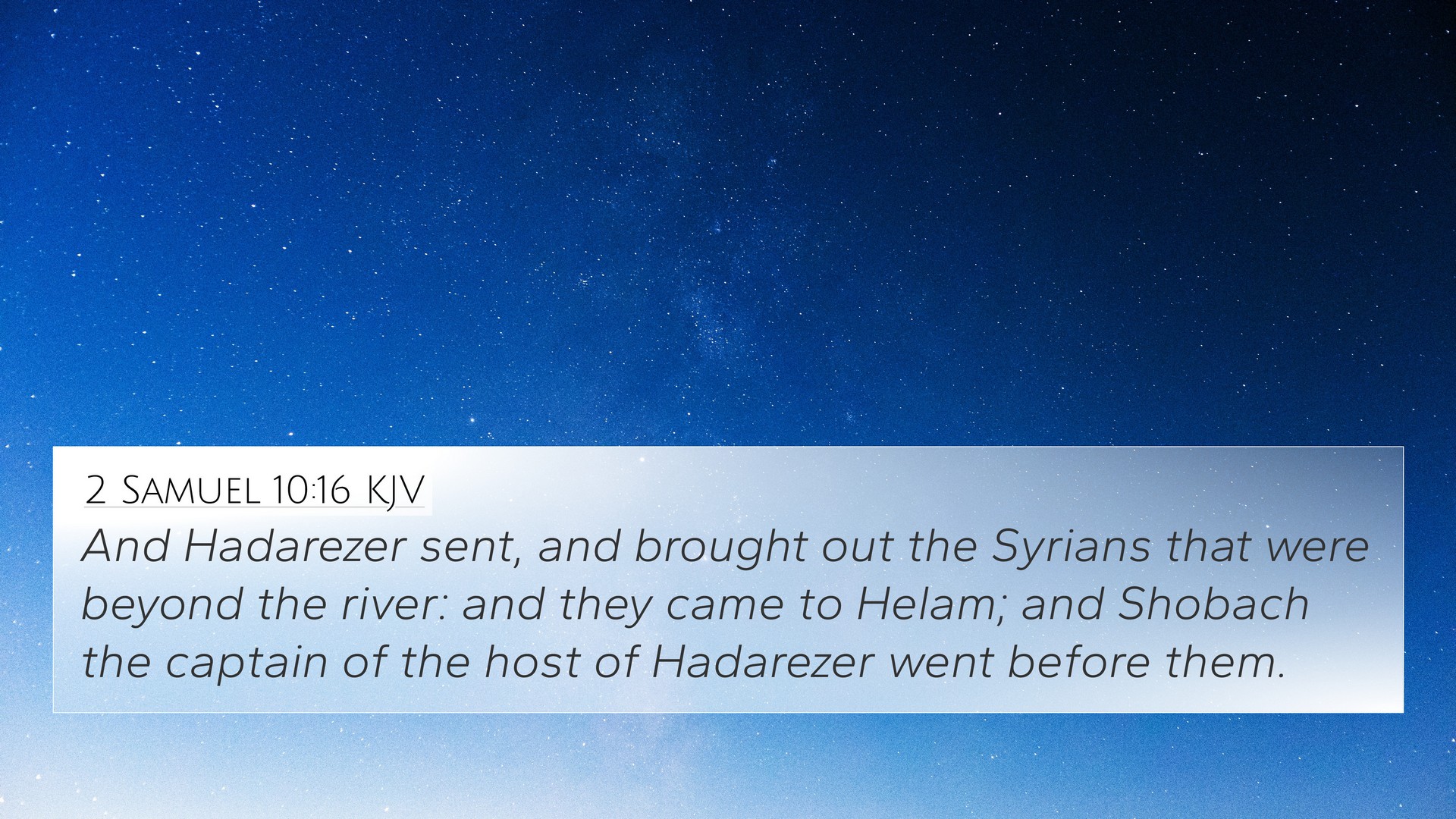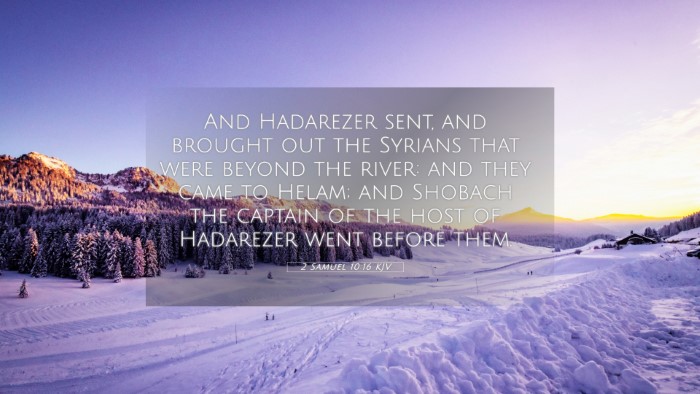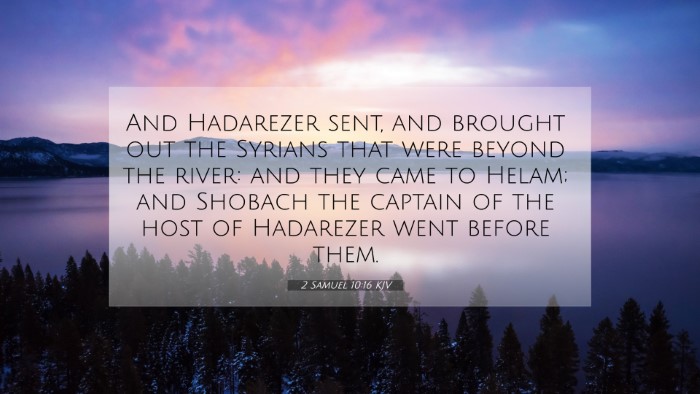Old Testament
Genesis Exodus Leviticus Numbers Deuteronomy Joshua Judges Ruth 1 Samuel 2 Samuel 1 Kings 2 Kings 1 Chronicles 2 Chronicles Ezra Nehemiah Esther Job Psalms Proverbs Ecclesiastes Song of Solomon Isaiah Jeremiah Lamentations Ezekiel Daniel Hosea Joel Amos Obadiah Jonah Micah Nahum Habakkuk Zephaniah Haggai Zechariah Malachi2 Samuel 10:16 Similar Verses
2 Samuel 10:16 Cross References
And Hadarezer sent, and brought out the Syrians that were beyond the river: and they came to Helam; and Shobach the captain of the host of Hadarezer went before them.
Uncover the Rich Themes and Topics of This Bible Verse
Listed below are the Bible themes associated with 2 Samuel 10:16. We invite you to explore each theme to gain deeper insights into the Scriptures.
2 Samuel 10:16 Cross Reference Verses
This section features a detailed cross-reference designed to enrich your understanding of the Scriptures. Below, you will find carefully selected verses that echo the themes and teachings related to 2 Samuel 10:16 KJV. Click on any image to explore detailed analyses of related Bible verses and uncover deeper theological insights.
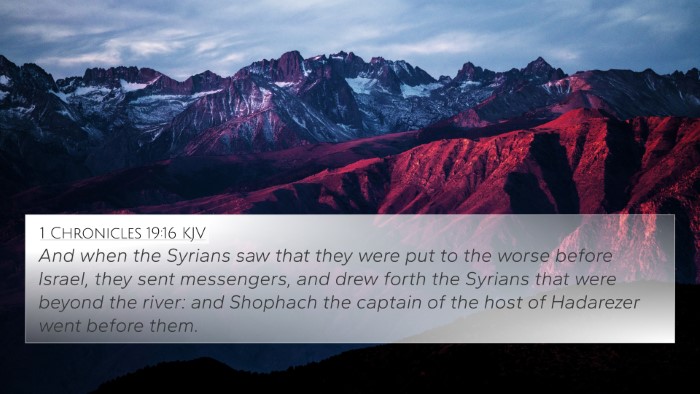
1 Chronicles 19:16 (KJV) »
And when the Syrians saw that they were put to the worse before Israel, they sent messengers, and drew forth the Syrians that were beyond the river: and Shophach the captain of the host of Hadarezer went before them.
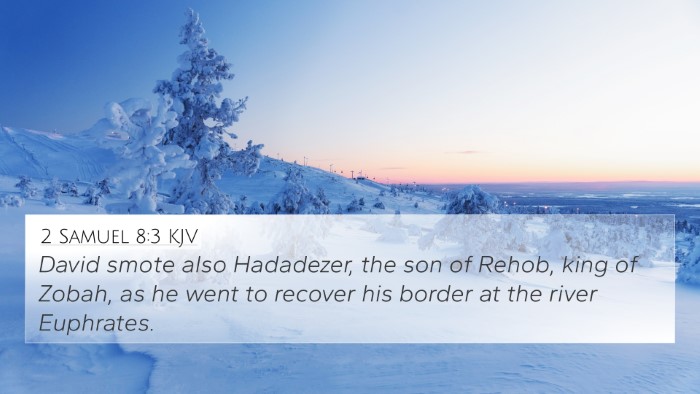
2 Samuel 8:3 (KJV) »
David smote also Hadadezer, the son of Rehob, king of Zobah, as he went to recover his border at the river Euphrates.
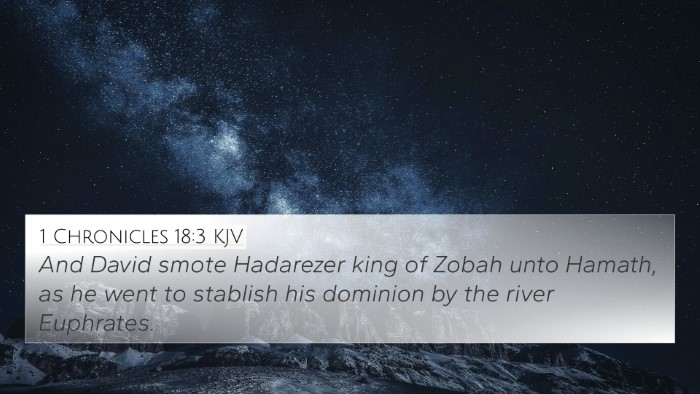
1 Chronicles 18:3 (KJV) »
And David smote Hadarezer king of Zobah unto Hamath, as he went to stablish his dominion by the river Euphrates.
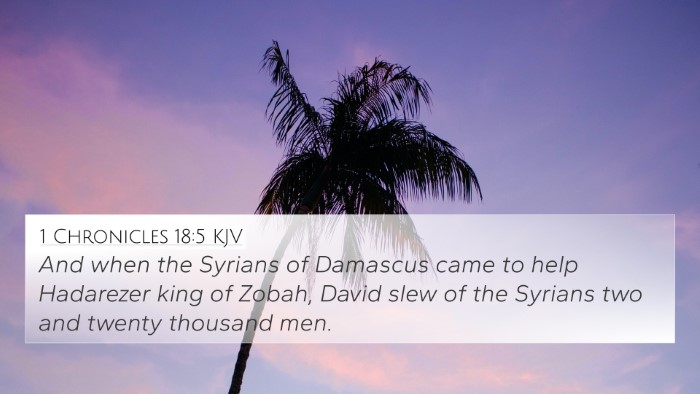
1 Chronicles 18:5 (KJV) »
And when the Syrians of Damascus came to help Hadarezer king of Zobah, David slew of the Syrians two and twenty thousand men.
2 Samuel 10:16 Verse Analysis and Similar Verses
Understanding 2 Samuel 10:16
Bible Verse: 2 Samuel 10:16 - "And Hadadezer sent, and brought out the Syrians that were beyond the river: and they came to Helam; and Shobach the captain of the host of Hadadezer went before them."
Overview and Context
This verse is situated in a narrative that focuses on the unfolding conflict between the kingdom of Israel and various neighboring nations, particularly the Syrians. Here, Hadadezer, the king of Zobah, seeks to strengthen his position against King David of Israel by mobilizing the Syrian forces.
Combined Insights from Public Domain Commentaries
Matthew Henry's Commentary
Matthew Henry observes the political maneuvering and strategic alliances at play in this verse. Hadadezer's appeal to the Syrians highlights a desperate effort to counter the growing strength of Israel under David's reign. Henry emphasizes that these events illustrate the folly of relying on human resources over divine strength.
Albert Barnes' Notes
Albert Barnes points out that Hadadezer's decision to bring in the Syrians may reflect both a tactical choice and a message of defiance against Israel. The mention of Helam indicates a geographical context where these conflicts arise. Barnes comments on the spiritual implications of seeking alliances over trusting in the Lord, reiterating that it often lead to greater ruin.
Adam Clarke's Commentary
Adam Clarke adds depth to the understanding of Syria's role in the ancient Near Eastern politics. He suggests that the captain Shobach signifies a structured military command rather than a chaotic response. Clarke emphasizes the importance of understanding the historical rivalries that shaped such alliances, giving insight into the broader biblical narrative of nations.
Bible Cross-References
- 2 Samuel 8:3 - David's earlier conquests over Hadadezer's forces relate directly to this verse, illustrating the continuing conflict.
- 1 Chronicles 19:7 - This parallel account provides additional context about the recruitment of the Syrians and their motives.
- Psalm 60:1-12 - A psalm reflecting on God's assistance in battles which contrasts Hadadezer's reliance on Syria.
- 2 Samuel 10:10 - The immediate verses surrounding this text elaborate the strategic engagements between Israel and their enemies.
- Isaiah 7:1 - This verse connects to the themes of alliances and battles involving Syria in later biblical history.
- Jeremiah 49:23-27 - Those verses show the ongoing conflicts involving Aram (Syria) and Israel, portraying a historical continuum.
- Luke 14:31 - Jesus uses the imagery of kings engaging in battle which echoes the themes of this verse regarding military alliances.
Thematic Connections
2 Samuel 10:16 explores themes such as:
- Military Strategy - The tactics and alliances formed in ancient conflicts resonate throughout biblical history, indicating a pattern of reliance on earthly power.
- Divine Sovereignty vs Human Strategy - A recurring biblical theme where humans seek resolution through carnal means rather than divine intervention.
- The Nature of Alliances - This verse opens discussions on the ethical considerations of forming alliances as demonstrated in both Old and New Testaments.
Conclusion
In summary, 2 Samuel 10:16 serves as a pivotal verse that illustrates the complexities of inter-national relationships in biblical times. By comparing and contrasting it with various scriptures, we can gain a richer understanding of its implications both in historical context and spiritual application.
Resources for Further Study
For those interested in further exploration of biblical texts and cross-references, tools such as Bible concordances and Bible cross-reference guides can be invaluable. Engaging in bible cross-reference study methods deepens comprehension and highlights the interconnectedness of scripture.
